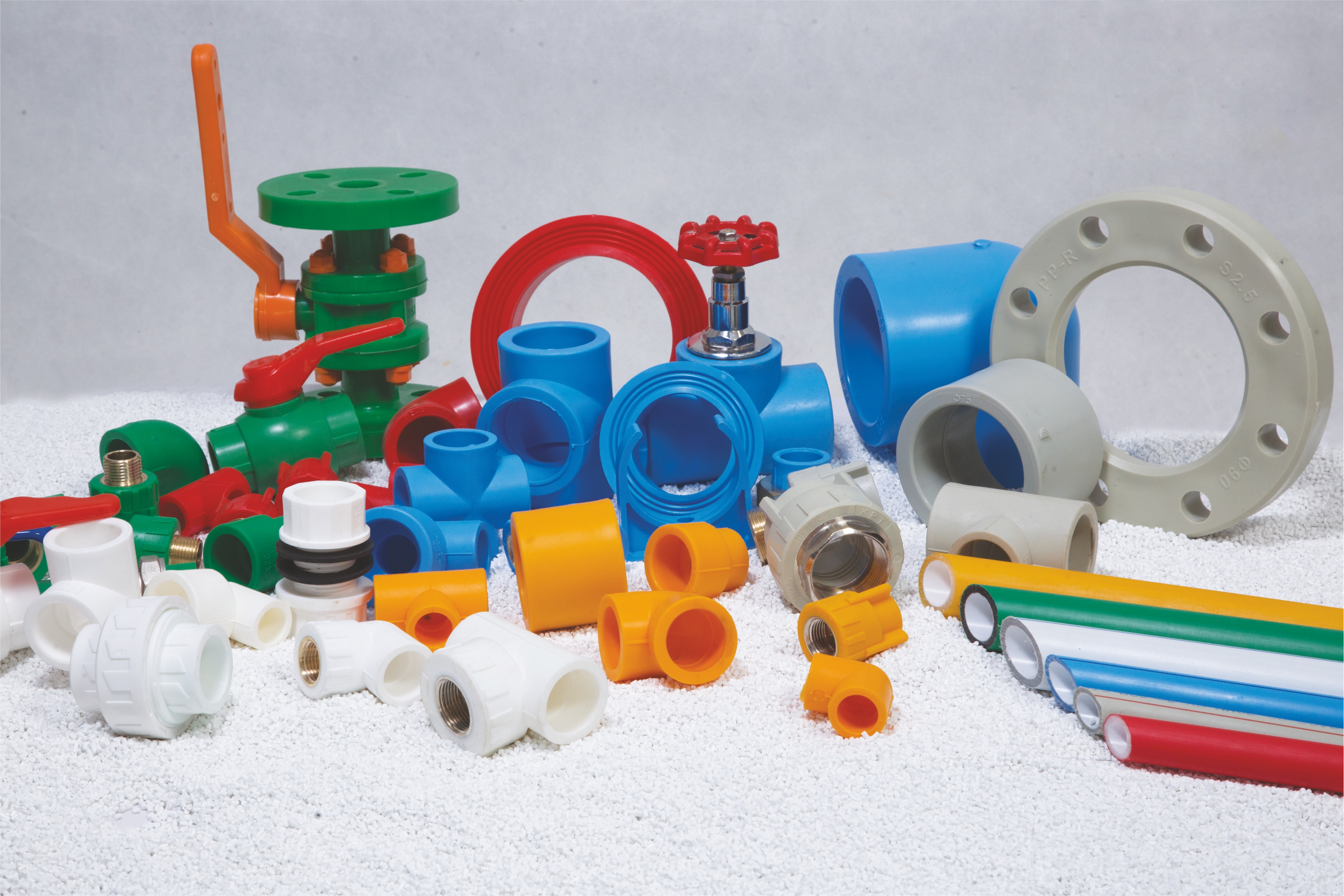
PPR pipes are made from a high-quality plastic material known as polypropylene random copolymer. This material is favoured for its resistance to high temperatures, corrosion, and chemical reactions, making it ideal for plumbing applications. PPR fittings are used to connect the pipes in various configurations, allowing the creation of intricate plumbing systems that can handle high pressure and temperature.
PPR pipes are commonly used in both hot and cold water systems, underfloor heating, and industrial fluid transportation. These pipes are also used in agricultural systems and in applications where water purity is crucial, such as in healthcare facilities.

1. Durability and Longevity
One of the most notable characteristics of PPR pipes is their remarkable strength and longevity. These pipes can last for decades, with a lifespan of over 50 years under normal conditions. The corrosion resistance of PPR pipes means they won’t degrade or lose their integrity over time, unlike metal pipes, which are susceptible to rust and scaling.
2. Resistance to High Temperatures
PPR pipes are designed to withstand both hot and cold water systems. Their ability to handle high temperatures (up to 95°C or 203°F) makes them an ideal choice for hot water applications such as bathrooms, kitchens, and industrial heating systems.
3. Lightweight and Easy to Install
PPR pipes are lighter than metal pipes, which makes them easier to handle, transport, and install. Their light weight also reduces the strain on supporting structures and makes them an ideal option for large-scale plumbing projects. The installation of PPR pipes is simple, involving a fusion welding process that ensures a secure, leak-free connection.
4. Cost-Effective
When compared to traditional plumbing materials such as copper or steel pipes, PPR pipes are more affordable. The material itself is cheaper to produce, and its long lifespan means fewer replacements and maintenance costs. PPR pipes also require fewer fittings than other pipe systems, reducing both material and labour costs.
5. Non-toxic and Environmentally Friendly
PPR pipes are safe for drinking water systems because they do not leach harmful chemicals. They are non-toxic and do not affect the taste or quality of the water. Additionally, PPR pipes are recyclable, making them an environmentally friendly choice for plumbing systems.
Each variety of PPR pipe is tailored to meet specific demands, including temperature resistance, pressure handling, chemical durability, and environmental conditions, ensuring optimal performance in a wide range of plumbing and heating applications.
Each type of fitting serves a specific purpose, helping to ensure the plumbing system operates efficiently and effectively, whether for residential, commercial, or industrial applications.
PPR pipes and fittings are used in a wide range of plumbing applications, both residential and commercial. Some of the common applications include:
1. Residential Plumbing
PPR pipes are frequently used in homes for hot and cold water supply systems. Their resistance to scaling and corrosion ensures that the water remains clean and safe to use over time.
2. Underfloor Heating Systems
PPR pipes are excellent for underfloor heating applications due to their ability to resist high temperatures. These pipes are often used in hydronic heating systems, where warm water circulates under the floor to provide efficient and even heating.
3. Industrial Applications
In industrial settings, PPR pipes are used to transport chemicals, acids, and other fluids that require high resistance to corrosion. Their ability to handle high pressure and temperature makes them suitable for various industrial environments, including factories, refineries, and power plants.
4. Agricultural Systems
PPR pipes are used in irrigation and agricultural water systems due to their ability to handle large volumes of water without degrading. The pipes are durable enough to withstand the pressures of large-scale irrigation systems, ensuring consistent water flow to crops.
The installation of PPR pipes is relatively straightforward, thanks to the fusion welding process. This process involves heating the ends of the pipes and fittings to a specific temperature and then fusing them together. This creates a strong, leak-free connection that ensures long-lasting performance. Unlike threaded connections, fusion welding does not require seals or gaskets, reducing the risk of leaks and improving the overall reliability of the system.

One of the major benefits of PPR pipes is their low maintenance requirements. Due to their resistance to corrosion, scaling, and chemical reactions, PPR pipes do not require frequent inspections or replacements. Regular cleaning and occasional checks for leaks or damages are typically sufficient to keep the system in optimal condition.

KPT Pipes is a leading manufacturer of high-quality pipes and fittings in India, specializing in providing durable and reliable solutions for a wide range of plumbing and industrial applications. With years of expertise and a commitment to quality, KPT Pipes has established itself as a trusted name in the pipe manufacturing industry. The company focuses on producing PPR (Polypropylene Random Copolymer) pipes and fittings, which are known for their exceptional performance and long-lasting durability.

PPR pipes offer superior durability, resistance to high temperatures, and strength compared to PVC pipes. While PVC pipes are suitable for cold water systems, PPR pipes can handle both hot and cold water systems, making them more versatile.
Yes, UV-resistant PPR pipes are specifically designed for outdoor use. These pipes are treated to resist the damaging effects of UV radiation from sunlight, making them suitable for exposed plumbing systems.
Yes, PPR pipes are non-toxic and do not leach harmful chemicals, making them safe for drinking water systems. They are widely used in residential and commercial plumbing for potable water distribution.
PPR pipes are known for their longevity. Under normal conditions, they can last for over 50 years, making them a cost-effective and reliable choice for plumbing systems.
Yes, PPR pipes are commonly used in industrial applications due to their ability to withstand high pressure, high temperatures, and aggressive chemicals. Specialized types like PPR-AL-PPR and PPR-CT pipes are ideal for industrial settings.
© 2025-26 KPT Piping System. All Right Reserved. | Privacy Policy